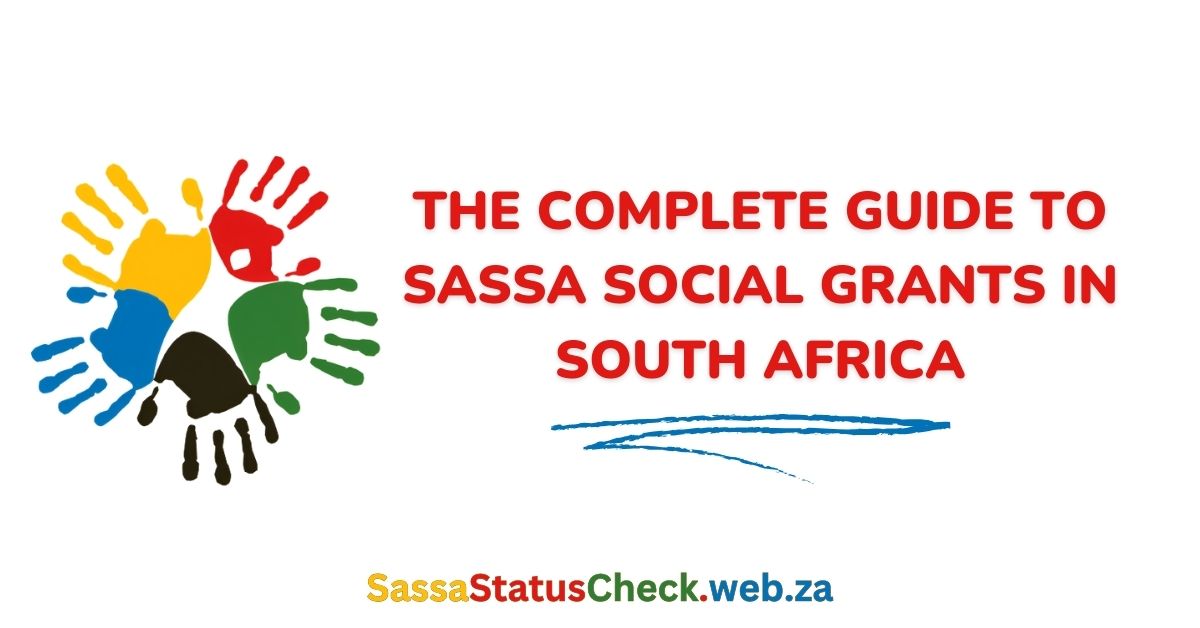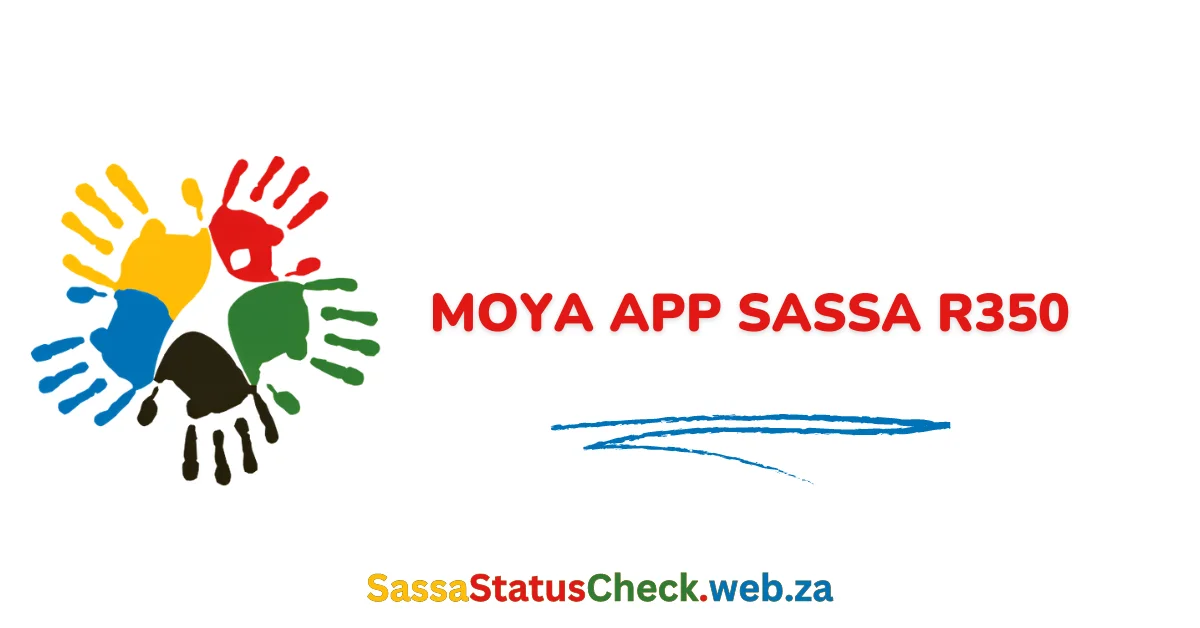The Complete Guide to SASSA Social Grants Types [2024]
In South Africa, social grants are a lifeline. The South African Social Security Agency (SASSA) manages these grants, helping millions of vulnerable citizens.
Children, people with disabilities, and older adults receive crucial financial support. I’ve seen firsthand how these grants make a difference in 2024, fighting poverty and supporting those in need.
Need to check your grant status? Checkout our SASSA Status Check tool.
This guide will walk you through the SASSA grants available in 2024. We’ll cover who can get them and how they change lives. These grants do more than provide money they give hope and opportunities. Let’s explore how they’re building a better future for South Africans.
Table of Contents
- 1 Overview of SASSA Social Grants [2024]
- 2 Types of SASSA Grants in 2024
- 3 1. SRD R370 Grant (Social Relief of Distress Grant)
- 4 2. Older Person’s Grant
- 5 3. Disability Grant
- 6 4. War Veterans Grant
- 7 5. Child Support Grant
- 8 6. Foster Child Grant
- 9 7. Care Dependency Grant
- 10 8. Grant-in-Aid
- 11 What is the Application Process for SASSA Grants in 2024?
- 12 Impact of SASSA Social Grants
- 13 Challenges and Future Directions
- 14 Conclusion
Overview of SASSA Social Grants [2024]
The South African government provides social grants to those who can’t support themselves or their families. These cash transfers are the backbone of our social security system. They ensure citizens can meet basic needs and live with dignity.
In 2024, over 18 million South Africans nearly 30% of our population receive these grants. This makes our system one of the world’s largest, showing our commitment to fighting poverty and supporting those in need.
SASSA manages these grants. They handle applications, payments, and make sure rules are followed.
Their goal? To provide help “responsibly, ethically and equitably.” They’re working to build a caring society for all of us.
Types of SASSA Grants in 2024
In 2024, SASSA offers several types of grants to cater to different needs and circumstances:
| Sr # | SASSA Grant Name | How Much is SASSA Grant Amount in 2024? |
| 1 | SRD R370 Grant | R370 (From April 2024) |
| 2 | Older Person’s Grant | R2,180 monthly (under 75 years) & R2,200 (over 75 years) |
| 3 | Disability Grant | R2,180 |
| 4 | War Veterans Grant | R2,200 |
| 5 | Child Support Grant | R530 |
| 6 | Foster Child Grant | R1180 |
| 7 | Care Dependency Grant | R2,180 |
| 8 | Grant-in-Aid | R530 |
Let’s examine each grant in detail:
1. SRD R370 Grant (Social Relief of Distress Grant)
The SRD R370 Grant, introduced in 2020 and updated in 2024, provides temporary financial relief for individuals facing challenging situations. This grant assists those who have lost income due to job loss, business closure, or an inability to work and earn money to support themselves and their families.
Eligibility Criteria:
- Be a South African citizen, permanent resident, or refugee with proof of status
- Lack sufficient resources to provide for family’s basic needs
- Be unemployed and without income support from other grants or UIF
- Not receive financial support from an employed spouse or family member
- Not be maintained in a state institution or funded NGO
- Must disclose efforts to secure income
Application Process: Applicants must complete the designated form and submit supporting documents to their nearest SASSA office or apply online through the SASSA website. The grant is paid monthly, with the potential for extension based on continued need and eligibility.
Impact: The SRD R370 Grant has proven to be a vital social safety net, especially during times of crisis. It has helped millions of South Africans weather financial hardships and maintain a basic standard of living during challenging periods.
2. Older Person’s Grant
The Older Person’s Grant, also known as the old age pension, provides financial assistance to men and women over the age of 60. This grant helps cover basic living costs and ensures a life of dignity in old age.
Eligibility Criteria:
- Be 60 years or older
- Be a South African citizen, permanent resident, or refugee
- Live in South Africa
- Have limited financial means
- Not be maintained in a state institution
Grant Amount:
- R2,180 monthly for beneficiaries under 75 years old
- R2,200 monthly for beneficiaries 75 years and older
Application Process: Applicants must visit their nearest SASSA office with the required documents, including ID, proof of residence, and bank details. A means test is conducted to assess the applicant’s financial situation.
Impact: The Older Person’s Grant has significantly reduced poverty among the elderly in South Africa. It enables older citizens to meet their basic needs, access healthcare, and maintain a degree of independence in their later years.
3. Disability Grant
The Disability Grant provides financial assistance to people between 18 and 59 years old who are unable to work due to physical or mental disabilities. This grant helps recipients meet basic living expenses and improve their quality of life.
Eligibility Criteria:
- Be a South African citizen, permanent resident, or refugee
- Be between 18 and 59 years old
- Be medically assessed as temporarily or permanently disabled
- Be unfit to enter employment due to disability
- Not receive other social grants
- Meet requirements of the means test
Grant Amount: R2,180 monthly
Application Process: Applicants must submit a medical assessment confirming their disability prevents them from working and earning an income. This assessment, along with other required documents, is submitted at a SASSA office.
Impact: The Disability Grant provides crucial support to individuals who might otherwise struggle to survive. It promotes independence and dignity for people with disabilities, allowing them to cover essential costs like food, housing, and healthcare.
4. War Veterans Grant
The War Veterans Grant provides financial assistance to South African citizens who served in World War II or the Korean War. This grant recognizes their service and contribution to the country.
Eligibility Criteria:
- Be over 60 years old or disabled
- Have fought in World War II or the Korean War
- Be a South African citizen
- Not receive another grant for adults
- Meet health requirements
- Meet income-based criteria
Grant Amount: R2,200 monthly
Application Process: Applicants must provide documentation proving their military service, along with other standard application documents, at a SASSA office.
Impact: While the number of recipients has decreased over the years, this grant continues to provide vital support to the few remaining war veterans and their spouses, ensuring they can live out their final years with dignity and comfort.
5. Child Support Grant
The Child Support Grant is paid to the primary caregivers of eligible children to help cover costs of food, clothing, shelter, and other basic needs. This grant plays a major role in reducing child poverty and promoting child well-being.
Eligibility Criteria:
- Child must be under 18 years old
- Applicant must be the primary caregiver of the child
- Child must be a South African citizen, permanent resident, or refugee
- Child must not receive other social grants
- Annual household income must be below a set threshold
- Child must not be cared for in a state institution
Grant Amount: R530 monthly per eligible child
Application Process: Primary caregivers (including parents, foster parents, grandparents, and other relatives) can apply at SASSA offices with supporting documents like birth certificates, IDs, and proof of income.
Impact: The Child Support Grant has been linked to improved health, nutrition, and school attendance among children. It significantly reduces the risk of hunger, stunting, and malnutrition, especially when received early in a child’s life.
6. Foster Child Grant
The Foster Child Grant provides financial assistance to foster parents who have legally adopted children through the children’s court. This grant helps cover the costs of caring for foster children.
Eligibility Criteria:
- Child must be legally placed in foster care
- Foster parent must have a court order granting custody
- Child must be under 18 years old
- Foster parent must be a South African citizen or permanent resident
- Child must not receive other grants
Grant Amount: R1,180 monthly per foster child
Application Process: Foster parents must provide a court order as proof of the foster care arrangement, along with other supporting documents, when applying at a SASSA office.
Impact: The Foster Child Grant supports foster families in meeting the needs of children requiring care outside their biological families. It helps ensure these children receive proper nutrition, education, and healthcare in their new homes.
7. Care Dependency Grant
The Care Dependency Grant provides financial assistance to caregivers of severely disabled children who need full-time care and attention. This grant helps caregivers meet the extraordinary costs of raising a child with severe mental or physical disabilities.
Eligibility Criteria:
- Child must be under 18 years old
- Child must have a severe mental or physical disability confirmed by medical assessment
- Child must need permanent home care due to disability
- Applicant must be the child’s primary caregiver
- Child must not be cared for in a state institution
Grant Amount: R2,180 monthly
Application Process: Application forms are submitted online or at SASSA offices, along with a medical assessment report confirming the child’s permanent disability.
Impact: The Care Dependency Grant relieves the financial burden on caregivers, enabling them to focus on providing proper care without compromise. It helps ensure that children with severe disabilities receive the specialized care and resources they need.
8. Grant-in-Aid
The Grant-in-Aid provides additional financial assistance to recipients of the Older Person’s Grant, Disability Grant, or War Veterans Grant who require regular attendance by another person due to their physical or mental condition.
Eligibility Criteria:
- Already receiving the Older Person’s Grant, Disability Grant, or War Veterans Grant
- Require full-time care and attendance of another person
- Suffer from physical or mental disabilities requiring assistance to complete daily tasks
Grant Amount: R530 monthly (in addition to the primary grant)
Application Process: A doctor must confirm that the beneficiary requires permanent care and attendance of another person. This confirmation, along with the application, is submitted at a SASSA office.
Impact: The Grant-in-Aid helps cover the additional costs associated with full-time care, ensuring that those with severe disabilities or age-related limitations can receive the support they need to maintain their quality of life.
What is the Application Process for SASSA Grants in 2024?
The application process for social grants involves submitting the required application forms, supporting documents, and undergoing assessment to determine eligibility. Here are the general steps to apply for SASSA grants in 2024:
- Determine eligibility: Research which grant you may qualify for based on your circumstances and the eligibility criteria.
- Gather documents: Collect necessary supporting documents, which typically include:
- South African ID or valid passport
- Proof of residence
- Proof of income or unemployment
- Bank statements
- Medical assessments (for disability-related grants)
- Obtain application form: Get the appropriate application form for your chosen grant. Forms are available online on the SASSA website or at SASSA offices.
- Complete the form: Fill out the application form with all required personal details, financial information, and reasons for applying.
- Submit application: Take your completed form and supporting documents to your nearest SASSA office. Some grants may offer online application options.
- Assessment: Your application will be assessed by SASSA officials to determine eligibility. They may request additional information if needed.
- Approval and payment: If approved, you should receive your first payment within 90 days. Grants are typically paid monthly to a SASSA card or bank account.
- Ongoing requirements: Provide life certificates confirming your status every 6 months. For temporary grants, you’ll need to re-apply once they expire.
Impact of SASSA Social Grants
SASSA social grants have a profound and far-reaching impact on South African society. Here are some of the key areas where these grants make a difference:
1. Poverty Alleviation Social grants lift millions of South Africans above the food poverty line. For the poorest 20% of the population, grants make up more than half of their income, providing a crucial buffer against extreme poverty.
2. Child Well-being The Child Support Grant has been linked to improved health outcomes, better nutrition, and increased school attendance among children. It significantly decreases the risk of hunger, stunting, and malnutrition, especially when received early in a child’s life.
3. Food Security Households receiving grants are more likely to be food secure compared to non-recipients. The additional income enables families to access sufficient, nutritious food on a regular basis.
4. Inequality Reduction By providing a basic income to the most vulnerable, social grants help narrow the gap between the richest and poorest in South Africa. This has a significant impact on reducing overall income inequality in the country.
5. Local Economic Growth When grant recipients spend their money on food, clothing, transport, and other necessities, it stimulates local economies. This effect is particularly noticeable in rural areas and small towns, where grant expenditure can have significant multiplier effects.
6. Healthcare Access Grant recipients are more likely to access healthcare services for themselves and their children due to the increased income. This leads to better health outcomes and enhanced affordability of health services.
7. Disability Rights and Inclusion Grants for people with disabilities provide income and promote autonomy. This leads to greater inclusion and participation of disabled individuals in society, helping to break down barriers and stigma.
8. Financial Inclusion The grant system brings marginalized groups into the formal financial sector. Recipients gain access to bank accounts, which can lead to increased financial literacy, access to credit, and opportunities for saving.
9. Education Grants, particularly the Child Support Grant, have been associated with increased school enrollment and attendance. This investment in education can have long-term positive effects on social mobility and economic growth.
10. Women’s Empowerment Many grant recipients are women, particularly for child-related grants. This puts financial resources directly into women’s hands, potentially increasing their decision-making power within households and communities.
11. Elderly Care The Older Person’s Grant ensures that elderly South Africans can meet their basic needs and often supports entire households. This promotes dignity in old age and reduces the burden on working-age family members.
12. Crisis Resilience As demonstrated during the COVID-19 pandemic, the social grant system provides a crucial safety net during times of crisis. The ability to quickly distribute additional funds through existing grant structures helps mitigate the impacts of economic shocks.
Challenges and Future Directions
While South Africa’s social grant system is extensive and impactful, it faces several challenges:
1. Fiscal Sustainability As the number of grant recipients grows, there are concerns about the long-term fiscal sustainability of the system. Balancing social needs with economic realities is an ongoing challenge.
2. Targeting and Eligibility Ensuring that grants reach those most in need while preventing fraud and abuse is a constant concern. Refining eligibility criteria and improving verification processes are ongoing efforts.
3. Grant Adequacy There are debates about whether the current grant amounts are sufficient to meet basic needs, especially in the face of rising living costs.
4. Administrative Efficiency Streamlining application processes, reducing waiting times, and improving service delivery at SASSA offices are areas for continued improvement.
5. Economic Integration While grants provide crucial support, there’s a need to create pathways for recipients to integrate into the formal economy where possible.
6. Technology and Access Expanding digital payment options and online application processes while ensuring accessibility for all, including those in rural areas, is an ongoing challenge.
Looking to the future, potential directions for South Africa’s social grant system include:
- Exploring Universal Basic Income: There are discussions about the potential for a universal basic income to simplify the grant system and provide a safety net for all citizens.
- Linking Grants to Development Programs: Integrating grant receipt with skills development, education, or job placement programs could enhance long-term outcomes.
- Improving Data Systems: Enhanced data collection and analysis could lead to more targeted and effective grant distribution.
- Climate Resilience: Considering how the grant system can support communities affected by climate change and environmental disasters.
Conclusion
SASSA’s social grants provide an essential safety net for millions of South Africans, offering a lifeline to those struggling to make ends meet. From providing dignity to the elderly and disabled to ensuring children are nourished and educated, each grant plays a vital role in supporting vulnerable individuals and families.
The impressive reach and impact of these grants demonstrate South Africa’s commitment to protecting its most vulnerable citizens. While challenges remain, the social grant system has proven to be a powerful tool for poverty alleviation, reducing inequality, and promoting social cohesion.
As South Africa continues to grapple with economic challenges and social inequalities, the social grant system stands as a beacon of hope and a model for social welfare policies worldwide.
By continuously refining and improving this system, South Africa can work towards a future where every citizen has the opportunity to live with dignity and reach their full potential.

I’m Thandiwe Mkhize, dedicated to promoting social welfare awareness in South Africa. My background in social work fuels my passion for helping vulnerable communities access vital information about their social grants through my website https://sassastatuscheck.web.za/


![SASSA Status Check Online | SRD Status Check for R350 [2024] SASSA-STATUS-CHECK](https://sassastatuscheck.web.za/wp-content/uploads/2023/08/SASSA-STATUS-CHECK.webp)
![SASSA Payment Dates for 2024/2025 [Updated SASSA Payment Schedule] SASSA Payment Dates for 2024/2025](https://sassastatuscheck.web.za/wp-content/uploads/2024/03/SASSA-Payment-Dates-for-20242025-1.webp)
![SASSA Change Banking Details for SRD R350 [2024] How to Change Banking Details for SASSA](https://sassastatuscheck.web.za/wp-content/uploads/2023/10/How-to-Change-Banking-Details-for-SASSA.webp)
![SASSA Change Phone Number for SRD Grant Online in [2024] SASSA Change Phone Number](https://sassastatuscheck.web.za/wp-content/uploads/2023/11/Your-paragraph-text-5-1.webp)
![SASSA Payment Dates for April 2024 [Payments Schedule Announced] SASSA Payment Dates for April 2024](https://sassastatuscheck.web.za/wp-content/uploads/2024/03/SASSA-Payment-Dates-for-April-2024.webp)
